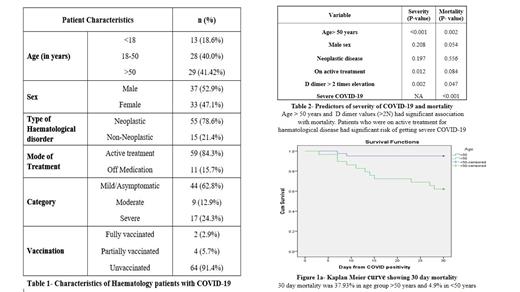Abstract
Introduction:
The COVID-19 pandemic is a global public health challenge that has affected more than 30 million people and taken more than 4 lakh lives in India. The first and second COVID waves have greatly impacted the lives of a vast majority and vaccination of the masses remains a struggle. Although SARS -CoV-2 infections in patients with hematological diseases are expected to have an adverse outcomes, only limited reports are available from India. Hence, our study aims to identify the outcome in terms of severity and mortality in this group and the risk factors involved in developing severe COVID-19 and death.
Methodology:
This is a cross sectional analytical study done in a tertiary care hospital in Southern India for a period of 11 months. All hematological patients irrespective of age, who were infected with SARS-CoV-2 during the first wave (June -December 2020) and second wave (March - June 2021) were consecutively enrolled for the study after IRB approval. The patients were then categorized as neoplastic (acute and chronic leukemia, lymphoma, myeloma, MPN and MDS ) and non-neoplastic (ITP, aplastic anemia, hemolytic anemia, MGUS and TTP ) diseases. The clinical data was collected retrospectively from the electronic medical records and by direct telephonic contact. Patients were categorized as having mild (spO2 > 94 % symptomatic /asymptomatic), moderate (spO2 90 - 94 %) and severe (spO2 < 90 %) disease based on their severity of infection, each category of patients received appropriate clinical management. Treatment details, mortality and other outcomes were recorded for 30 days. The continuous variables were represented as mean (± SD)/median (IQR) and categorical variables as frequency and percentage. The association of the outcome variable with selected variables were calculated using Chi-square tests and kaplan meier survival analysis. The data sets were analyzed (SPSS version 21) and a p value of < 0.05 was considered statistically significant.
Results:
The study was conducted with 70 patients (n=70). Demographic details of patients are summarized in Table 1.Seventeen (24.3%) out of 49 (70%) hospitalized patients required ICU care. There were 13 (18.6%)deaths. in the patients who survived, prolonged antigen positivity of COVID on testing after 21 days was seen in 9 patients (16.1%). In 35 patients (50%)hematological treatment was restarted with a mean delay of 9.2 +/- 10.72 days. Predictors of severity of the disease is summarized in Table 2. Age more than 50 years (P=0.002)(Figure 1a), severe COVID (P=<0.001) and D dimer value of >2 times normal (P=0.047) were associated with a 30-day mortality. Additionally, patients on active treatment for hematological disease were at greater risk of severe COVID (P=0.012). There was no significant difference in severity (P=0.197) or mortality (P=0.556)in patients with neoplastic vs. non-neoplastic disorders
Conclusion:
COVID-19 patients with malignant and non-malignant hematological diseases showed an increased mortality. Age > 50 years and high D dimer values (>2N) were identified as predictors of mortality. Active treatment for haematological disease predisposed to severe disease.The study needs to be validated further on a larger cohort of patients . Preventive strategies including vaccination is warranted in patients with hematological disorders.
No relevant conflicts of interest to declare.


This feature is available to Subscribers Only
Sign In or Create an Account Close Modal